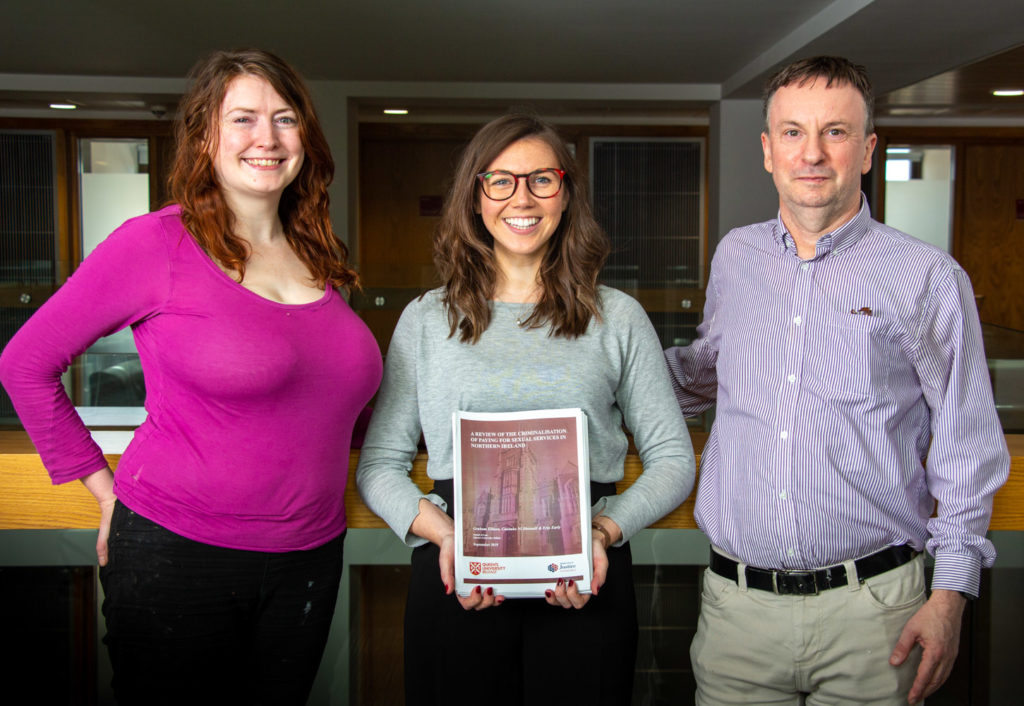ISWRN RESEARCH PROJECTS
The ISWRN in the News
The Department of Justice , the Northern Ireland assembly release a report written by Dr Graham Ellison, Dr Caoimhe Ni Dhonail and Ms Erin Early Queen’s University Belfast.
The Team

Review of sex purchase legislation in Northern Ireland
In 2018 the Northern Ireland Department of Justice commissioned research into the effectiveness of sex purchase legislation introduced by the Northern Ireland Assembly in June 2015. The scope of the research examined the demand for commercial sexual services post legislation, the supply of commercial sexual services post legislation and the effects of the legislation on the safety and wellbeing of sex workers who have worked in Northern Ireland.
The research was undertaken by Graham Ellison, Caoimhe Ní Dhónaill & Erin Early from the School of Law at Queen’s University, Belfast.
Northern Ireland is the only jurisdiction where sex purchase legislation is in force to have prevalence data for commercial sex from before and after the legislation was implemented. An earlier Department of Justice study in 2014 established baseline data for the extent of commercial sex in the jurisdiction. As such, the current research can test whether the sex purchase legislation has lived up to its stated aims and objectives.
Key findings of the research
- There has been no significant reduction in the supply of commercial sexual services in Northern Ireland since the sex purchase legislation was implemented. An analysis of 173,460 advertisements for commercial sexual services from one Adult Services Website (ASW) shows that there was actually a 5% increase in advertising after the law came into force.
- The research identified 4,717 sex workers who advertised their services on one ASW. 1,798 of these started selling sex after the sex purchase law was implemented.
- The average number of daily sex workers available in Northern Ireland is estimated at 308. This does not show any reduction in the figure given in the earlier DOJ research in 2014.
- Commercial sex is concentrated in the large urban centres of Belfast and L/Derry. However, all parts of Northern Ireland have some commercial sex occurring with the largest increase post-legislation seen in Co Tyrone, which recorded a 134% increase (i.e. from 4,978 to 11,661 advertisements).
- The on-street sector in Belfast and other large cities in Northern Ireland is now marginal with only around 5 on-street sellers operating in Belfast. It may be the case that the legislation has had a displacement effect from the street to the Internet.
- The data indicate that the provision of commercial sexual services in Northern Ireland is globalised with over 100 nationalities of sex worker recorded in the data.
- The legislation appears to have no deterrent effect in purchasing commercial sexual services. Of the two cases that have been prosecuted in the Northern Irish courts neither involved prostitution or human trafficking for sexual exploitation.
- The research findings reveal the difficulties in enforcing sex purchase legislation in the digital age. For example, in the context where the vast bulk of commercial sex (around 99%) is conducted online and out of sight of enforcement agencies.
- There does not appear to have been any significant reduction in demand for commercial sexual services. Only a small minority of Northern Irish clients (11.6%) are likely to be put off purchasing sex because of the legislation.
- A majority of Northern Irish clients (75.9%) feel that purchasing sex is just as easy now as it was before the legislation came into force.
- The study did not uncover the levels of serious violence directed to sex workers that were predicted by some opponents of the legislation.
- The research did record an increase in intermediate level crimes and a range of anti-social and nuisance activities that have an impact on the sex worker’s psychological wellbeing.
- Survey data indicate that since the legislation came into effect there has been a 677% increase in abusive phone calls to sex workers while threatening behaviour has increased by 200%.
- Sex worker respondents were very positive about the PSNI’s appointment of sex worker liaison officers who provide a supportive role to sex workers who are in need of assistance.
Exploring the Impact of The Sex Purchase Ban on The Health and Well Being of Sex Workers in Ireland: A HIV Ireland/ISWRN Collaboration
The Team
This project is funded by HIV Ireland and is being undertaken by researchers (Dr Kathryn McGarry and Dr Paul Ryan) from the ISWRN (Irish Sex Work Research Network) in collaboration with SWAI.
Project overview
The project seeks to explore the perceived impact of the new laws to criminalise sex purchase on the health and well being of sex workers. HIV Ireland indicated a particular interest in the experiences of migrant sex workers under the new laws, and we thought it would be a good opportunity to explore how all sex workers are experiencing sex working under the current laws, how it has impacted or not on their health and well being and what this all means for policy and services.
While the study itself is a small scale, scoping study, we are committed to ensuring that the voices of sex workers are central to the research and are seeking to create a participative space for this study where the research is WITH not ON sex workers. We have invited sex workers to participate if interested as peer facilitators (described in more detail in separate attached document).
The research will involve a number of phases of data collection due to take place over the summer months (July, August)
- Focus groups with sex workers in Dublin, Limerick and Cork
- Focus group with service providers
- Online anonymous survey with sex workers
It is hoped that the focus groups with sex workers will inform the development of a short online anonymous survey with sex workers to be distributed through various networks in order to reach a larger pool of people for inclusion in the study. This survey will include some brief questions relating to some of the key issues impacting health and well being and views regarding policy and service provision for sex workers.
This data collection will generate findings which we will compile in a report for HIV Ireland by October 2019.
The Team


The study is called “Working It” and it aims to discover street workers’ knowledge and experience of the current legislation around sex work in Ireland (since the 2017 Criminal Law Act). We are interested in how sex workers organise their work within this legal context, using (or not) their social networks and psychological resilience skills. There will be a comparative aspect to this study in terms of location, by recruiting participants from Limerick and Dublin. We will also compare participants’ experiences before and after a sex-worker-led intervention where they will find out about their rights and choices, resulting from the new legislation.
This study is a partnership between GOSHH (Gender, Orientation, Sexual Health, HIV) and Psychology, at University of Limerick. The research team is led by Anca Minescu and Billie Stoica. The project takes place between September 2019 and May 2020, with funding from the Dormant Accounts funds of the Anti Human Trafficking Unit in the Department of Justice.
The study is important because until now, street workers’ voices have largely been silent in the national discussion around legislative changes governing sex work. It is crucial to understand how sex workers experience the law, and how the law impacts on their lives, while considering their voices, their interpretations and their own positioning in society, from a psychological perspective. Given that there is an upcoming legislative review, we are hoping the results of this research will feed into the review process. In addition to the potential legislative impact, our research aims to develop a trauma-informed, low-threshold, psychological best practice toolkit to guide future research conducted with sex workers.
